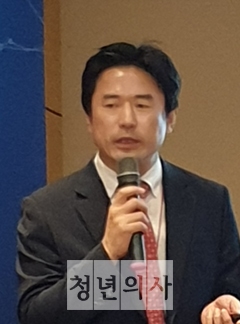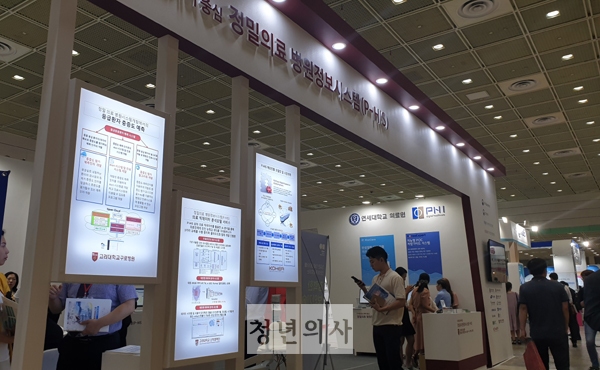Korean hospitals have completed building a pilot cloud-based system to collect scattered medical information and turn them into “useful” big data. Three medical institutions under the Korea University Medical Center are using the system for trial.

Korea University Anam Hospital Professor Lee Sang-heon, who is leading the Precision-Hospital Information System (P-HIS) project, said if hospitals use the latest system, instead of their own, they will be able to cut the operation cost to one-fifth.
Sharing scattered medical information in a cloud could produce “quality big data,” Lee said. Eighty-one hospitals are cooperating for the cloud system project.
Lee introduced the status of P-HIS project at K-Hospital Fair 2019 at COEX, southern Seoul, on Wednesday. The Ministry of Science and ICT and the Ministry of Health and Welfare are pushing the project as a national strategy.
The P-HIS project team made the system in modules so that hospitals can pick and choose them depending on their expertise. The system has 24 essential modules for patient care, administration, and support for care, and 14 optional modules for critical patients, baby delivery room, and newborn unit. By analyzing terms and codes used by domestic hospitals, the system has standardized them into 37,000 international terms and codes.
The team built the cloud to help hospitals share information and established a system to protect privacy, certified with ISO 27799, which gives guidelines for medical information protection.
“The world is in a war to secure healthcare data. Training artificial intelligence (AI) and determining the level of AI doctors depend on how good the data is,” Lee said. “It is important to gather excellent data. However, hospitals here have different programs that make it impossible to share information.”
To provide customized patient care in the era of AI, hospitals should make big data, Lee went on to say. To do so, it would be the best idea to upload the information on a cloud, he said. “If hospitals use a standardized system, 10 hospitals can collect data just in a year, while it could take 10 years to do the same without the system. That way, we can make globally advanced big data,” he explained.
Korea University Anam Hospital, Korea University Guro Hospital, and Korea University Ansan Hospital are using the pilot P-HIS system. Next year, tertiary hospitals with more than 1,000 sickbeds will be able to use the system, he said.
“Using a cloud-based hospital information system will reduce the cost a lot. We had expected around 35 billion won ($29 million) to 50 billion won to build the existing information system for the hospitals under Korea University Medical Center, but it cost only 17 billion won to build the cloud-based system this time,” Lee said.

In the future, the cost will go down to about 5.5 billion won, and more participation by other hospitals will push down the cost further, he added.
What’s more important than reducing the cost was sharing of the system among hospitals so that they can make globally competitive big data, he added. Singapore had already built the cloud-based system two years ago, according to Lee.
“The Fourth Industrial Revolution is both an opportunity and a risk. If we miss an opportunity to leap forward, there is no way but going backward. Korea could be left behind China,” Lee said. “Korea has the world’s leading competence in clinical care. The nation has excellent human resources. However, it is lagging in deregulation such as too strict enforcement of the Personal Information Protection Act.”

